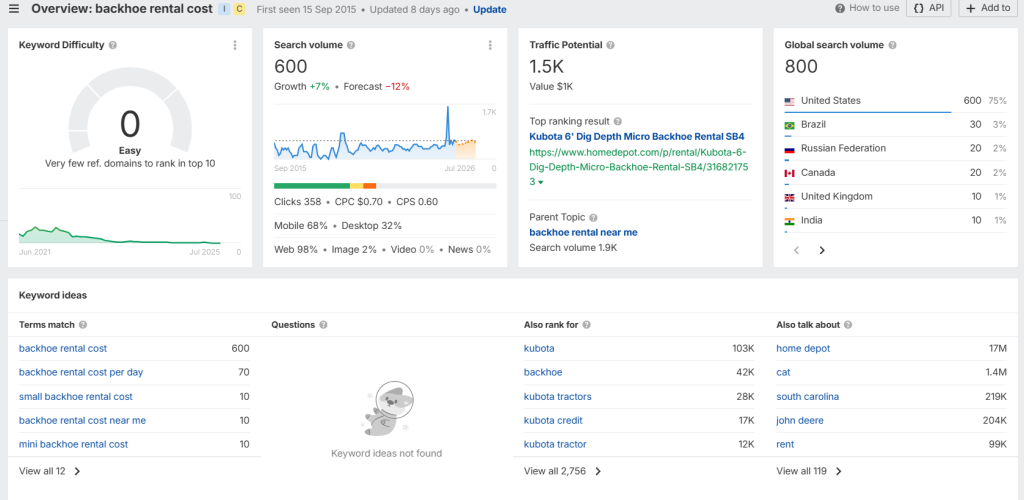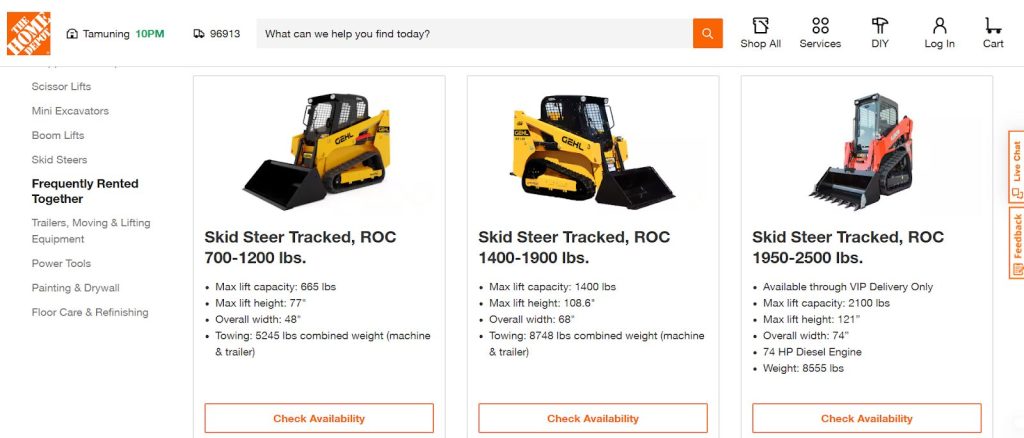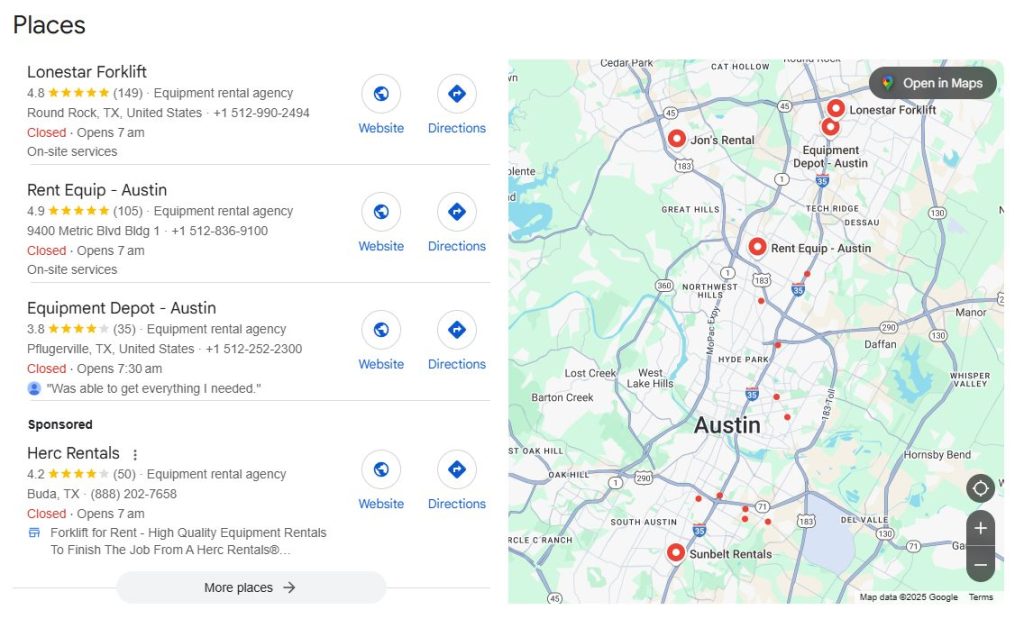Table of Contents


Want to Boost Rankings?
Get a proposal along with expert advice and insights on the right SEO strategy to grow your business!
Get StartedWritten by Dileep Thekkethil
- Updated Nov 5, 2025
Reading Time: 14 min read
- What Is SEO for Equipment Rentals?
- Why Does SEO Matter for Equipment Rental Businesses?
- How SEO for Equipment Rentals Works Proven SEO Strategies for Equipment Rental Businesses
- SEO Tips for Different Types of Equipment Rentals
- What are the Common SEO Mistakes Equipment Rental Companies Make?
- Tracking SEO Success for Rental Businesses
- Conclusion
- FAQs
The demand for rental equipment is at its peak.
From construction and landscaping to corporate events and personal DIY projects, an increasing number of people are opting to rent instead of buy.
The global construction equipment rental market alone is projected to surpass $140 billion by 2025.
That kind of growth means more businesses are entering the market, which makes it harder to stand out unless you’re highly visible in search engines.
This is exactly where SEO for Equipment Rentals comes in.
For equipment rental companies, SEO is a powerful strategy to appear where potential customers are already looking for products on Google for rent.
If it is done right, SEO helps you generate steady traffic, drive qualified leads, and increase bookings without relying heavily on ads.
Free SEO Audit: Uncover Hidden SEO Opportunities Before Your Competitors Do
Gain early access to a tailored SEO audit that reveals untapped SEO opportunities and gaps in your website.

It’s about showing up at the right moment when people need your services the most.
In this guide, you’ll learn everything about SEO for equipment rentals and the best strategies you can adopt to improve your search visibility on Google.
Keep reading!
What Is SEO for Equipment Rentals?
SEO for equipment rentals involves optimizing your website to improve your business’s ranking in Google and other search engines when users search for terms related to your offerings.
This could be something as direct as “mini excavator rental near me” or as specific as “wedding tent hire in San Diego.”
Instead of chasing after potential customers with traditional ads, SEO allows them to find you naturally.
That’s the biggest shift.
People are no longer flipping through directories or waiting to see a flyer.
They’re looking for instant answers, so they search online for instant results.
If your business shows up at the top of those results, you’re in a strong position to earn your audience’s trust and convert them into customers.
But SEO isn’t just about stuffing your site with keywords.
It’s about understanding what your audience is searching for, creating helpful content around those needs, optimizing your pages technically, and building the kind of authority that search engines recognize.
For rental businesses, this also means targeting specific service areas and equipment types to ensure you’re reaching the right customers at the right time.
Why Does SEO Matter for Equipment Rental Businesses?
1. Your Customers Start Online
Most customers looking to rent equipment don’t start by calling around, they go straight to Google.
Over 70% of service-related searches now begin online.
That means your first impression is often made on a search results page.
If someone types in “scissor lift rental in Chicago” or “tent hire for wedding near me,” and your business doesn’t show up in those results, you’re losing that customer to a competitor who does.
SEO ensures you appear in those key moments when potential clients are actively searching for what you offer.
2. Local Search Visibility Drives Walk-In and Online Bookings
For rental businesses, local visibility is everything.
Most customers prefer to rent from nearby companies to save on delivery costs or because they need equipment quickly.
When your business appears in Google’s local pack or map listings, it builds trust and drives both online and walk-in bookings.
Local SEO focuses on ensuring your business appears when someone nearby searches for your services.
That means optimizing your listings, having consistent business information, and using location-specific keywords so customers know exactly where you operate.
3. SEO Brings Consistent Leads Without Paying for Every Click
Unlike paid advertising, where the leads stop the moment your budget runs out, SEO continues to work in the background, 24/7.
Once your pages start ranking, they can generate consistent traffic without requiring ongoing spending.
This is a significant advantage for rental businesses seeking to reduce their cost per lead and grow sustainably.
While SEO takes time and effort upfront, the long-term payoff is a steady stream of qualified visitors who are already interested in what you offer.
4. Competitive Advantage in a Crowded Market
The equipment rental industry is highly competitive, particularly in areas of high demand.
If you’re ranking on the second or third page of Google, you’re likely invisible to most potential customers.
But ranking just a few spots higher can make a major difference in your monthly calls, quote requests, and bookings.
A smart SEO strategy helps you climb above the competition in search results, so you’re not just part of the crowd—you’re leading it.
How SEO for Equipment Rentals Works: Proven SEO Strategies for Equipment Rental Businesses
Now you know what is SEO for equipment rentals and its benefits, let’s now look at how it works:
1. Keyword Research for Rental-Specific Searches
Everything in SEO starts with keyword research.
For an equipment rental business, this means figuring out exactly what phrases people are typing into search engines when they’re ready to book.
Searches like “rent bulldozer Houston,” “tool hire near me,” or “backhoe rental cost” are considered long-tail keywords.

These phrases are specific, and they usually come from people who are closer to making a decision.
Understanding these keywords enables you to create content and service pages that align with what your audience is looking for.
But keywords aren’t just about volume, they’re about intent.
Some people are researching, while others are ready to rent right now.
Effective SEO involves aligning your content with the user’s stage in the buying journey.
2. On-Page SEO for Rental Pages
Once you know which keywords to target, the next step is to ensure your website is set up to support them.
This is where on-page SEO comes in.
Each rental product or service page should have a clear, keyword-rich title and a structured layout.
A page for “Heavy Duty Skid Steer Rental” shouldn’t just list the product, it should explain what it’s used for, include key specifications, and highlight why someone should rent it from you instead of a competitor.
Here, look at The Home Depot, they have listed their Skid Steer Rental Products and also include why a customer should rent a skid steer from them.


Using schema markup also helps search engines better understand your content.
It’s a type of code that provides Google with additional details about your listings, which can help you earn rich results in search, such as star ratings, availability, or pricing information and also list other relevant pages. Look at SunBelt Rentals, they have used schema markups to display relevant pages in the search results alongside their main results.
Look at SunBelt Rentals, they have used schema markups to display relevant pages in the search results alongside their main results.
Also, another key feature in on-page SEO is meta tags.
Your meta title and meta description are what show up in Google’s search results, so they should be clear, compelling, and keyword-optimization.
Together, strong on-page elements like headers, keyword rich content, internal linking, schema, and meta tags form the foundation of a well-optimized rental page.
When this is done right, your pages stand a much better chance of appearing higher in search results and capturing the attention of potential customers.
3. Local SEO Strategies
If your business serves specific cities, neighborhoods, or regions, local SEO is where you need to focus.
This starts with optimizing your Google Business Profile.
Ensure that your hours, address, photos, and service details are accurate and up-to-date.
Include location-based keywords on your site and GBP profile—terms like “forklift rental in Austin” or “event tent rental Brooklyn,” so that you can rank higher in the local search results.
This is the local 3-pack:

If you don’t rank within the top 3 of the local pack, you’ll be losing your local customers to your competitors.
So, create separate landing pages for each location you serve to capture traffic from a wider area.
And don’t forget about consistency.
Your business name, address, and phone number (also known as NAP) should be consistent across all online directories and citations.
This consistency strengthens your local presence and helps search engines trust your listings.
4. Content Marketing to Educate and Rank
Content marketing is more than just blogging.
It’s your opportunity to build trust, answer questions, and guide your audience toward renting from you.
A blog post like “How to Choose the Right Excavator for Your Job Site” isn’t just helpful, it also positions your business as an expert.
Service area guides, maintenance tips, and seasonal equipment checklists all help increase your visibility in search while keeping potential renters engaged with your brand.
When you consistently create content that’s both informative and aligned with your keywords, it opens up more ways for people to discover your business, even if they’re not ready to rent just yet.
5. Link Building for Authority
Search engines don’t just look at your content, they also pay attention to how many trustworthy websites are linking back to you.
These backlinks serve as digital votes of confidence, enhancing your site’s credibility.
When I Googled “Rentals Equipment”, I found Crescorent ranking in the first place. So I checked their backlink profile using Ahrefs and I found that they have over 1,389,000 backlinks.
So, the stronger your link profile, the more likely you are to outrank competitors in search results.
To strengthen your backlink profile, get featured in a construction directory, mentioned by a local event planner, or linked from an industry blog, these help increase your domain authority.
You can also build links by collaborating with vendors, writing guest posts, or getting featured in local press.
To strengthen your backlink profile, you must consistently build backlinks from reputable and authoritative sources within your industry.
This is where most equipment rental companies get stuck, as they lack the knowledge to validate a site, pitch it, and establish a link.
In the end, they just quit the online market, thinking it doesn’t give any profit.
To help you resolve this situation, you need the guidance of experienced experts.
When you hire our powerful link-building service, our seasoned professionals will create a tailored link-building strategy based on the market trends, competition, and your website’s health, thereby strengthening your backlink profile.
Since we have established contacts with industry experts, influencers, webmasters, and journalists, link building becomes easier and more effective.
6. Technical SEO Basics
Even the best content won’t rank well if your website isn’t built properly.
Technical SEO is all about making sure your site is easy to navigate, loads quickly, and functions smoothly on both desktop and mobile devices.
Since many people search for rentals from their phones, mobile-friendliness is critical.
Similarly, speed is crucial—slow-loading pages lead to high bounce rates and lower rankings.
Ensure your site structure is clean, your URLs are readable, and your internal links facilitate quick navigation for users.
Here is an example of how an URL structure should be:

Structured data also plays a big role here.
It tells search engines how to read your product pages, service details, and even customer reviews, giving you more visibility in search.
SEO Tips for Different Types of Equipment Rentals
1. Construction Equipment SEO
When optimizing for construction rentals, speak directly to contractors and project managers.
Use clear terminology that reflects what professionals are searching for, and include important specifications such as weight limits, attachments, and certifications.
Dedicated pages for key equipment types—such as “Crane Rental Los Angeles” or “Dump Truck Hire Atlanta”—help you appear in high-intent searches.
Don’t forget to mention safety standards, delivery options, and support services.
2. Event Equipment Rental SEO
This category is all about visuals and experience.
Ensure your event rental pages include photos of the setup, breakdown details, and policies for items such as weather conditions or cancellation procedures.
People searching for event rentals often want reassurance and clarity.
If you provide services for weddings, festivals, or corporate functions, create separate pages that cater to each type of event.
Include answers to common questions to build trust and drive bookings.
3. DIY/Tool Rental SEO
When marketing to homeowners and weekend warriors, your tone should be friendly, practical, and helpful.
Offer clear guidance on how to use your tools safely and effectively.
A homeowner searching for a “power washer rental for deck cleaning” might appreciate a short guide or checklist that explains what to expect.
Use your content to clarify, address questions, and highlight the benefits of short-term rentals for common projects.
What are the Common SEO Mistakes Equipment Rental Companies Make?
Many rental companies repeatedly make the same mistakes. Here are some of the common mistakes that equipment rental companies make:
- Ignoring Local SEO: Many rental companies overlook the importance of local search engine optimization, missing out on valuable customers in their local area.
- Poor Product Page Optimization: Instead of creating a separate page for each product, companies often group multiple items and list them on a single page. This makes it difficult for search engines to rank individual products and for users to find exactly what they are looking for.
- Relying only on Paid Ads and Low-Quality Directories: Focusing only on paid advertising or low-quality directory listings may bring short-term results but does not build sustainable, long-term organic traffic.
Tracking SEO Success for Rental Businesses
To know whether your SEO efforts are working, you need the right tools.
Google Analytics helps you track how people discover and interact with your site.
Google Search Console shows you the keywords you’re ranking for and identifies any issues that may be holding your site back.
For more detailed insights—especially around local rankings and competition—you can use platforms like SEMrush and BrightLocal.
These tools provide a comprehensive view of how your SEO is performing in your target areas.
Pay attention to organic traffic, keyword rankings, and how often your business shows up in the local pack.
But don’t stop there.
Track real actions—like contact form submissions, phone calls, and online booking confirmations.
These are the signals that show your SEO is turning visibility into actual business results.
Conclusion
In a competitive and fast-growing market, SEO is one of the smartest ways to grow your equipment rental business.
It helps you attract more of the right customers, increase your bookings, and reduce your reliance on paid ads.
The most important thing? Don’t wait.
Whether you do it yourself or work with a professional, optimizing your website for search is something you can’t afford to ignore.
Your potential customers are already searching for services like yours.
Make sure they find you first.
FAQs
How Long Does SEO Take for Equipment Rental Websites?
Typically, it takes between six and twelve months to notice significant improvements in traffic and rankings. Timelines vary based on site health, competition, content quality, and link acquisition.
Should You Hire an SEO Agency for Your Equipment Rental Business?
An experienced SEO partner can bring proven strategies, access to premium tools, and ongoing support tailored to your business goals—freeing your team to focus on operations.
Is Equipment Rentals SEO Better Than Paid Ads?
If you want to strengthen your equipment rentals business’s online presence for the long run, yes—SEO is typically better than paid ads. SEO compounds over time and lowers cost per lead, while ads stop producing the moment you pause spend. The best approach pairs always-on SEO with targeted paid campaigns for quick wins.
About the author
Share this article
Find out WHAT stops Google from ranking your website
We’ll have our SEO specialists analyze your website—and tell you what could be slowing down your organic growth.
What People Say About Us
Hear from our clients about their experience with our high-quality SEO services.
Join the 2500+ business that trust our SEO optimization services






















 5
5


